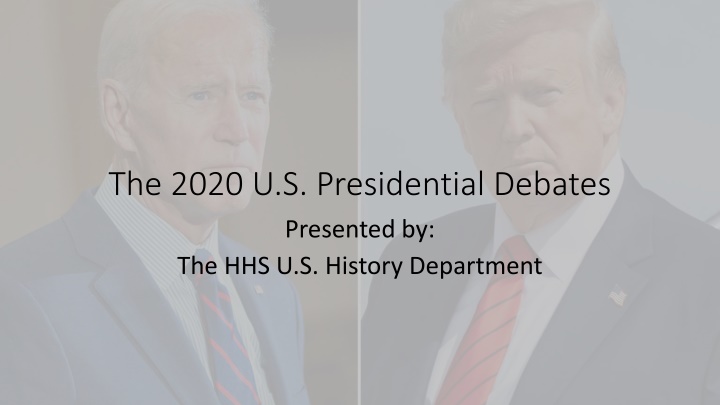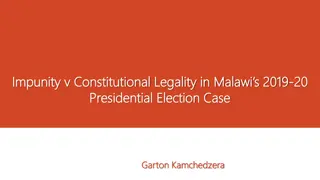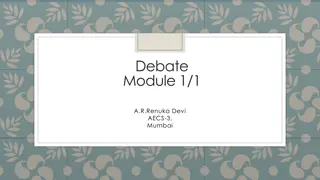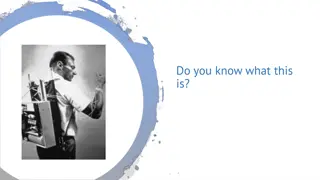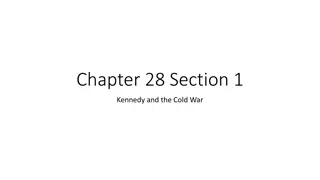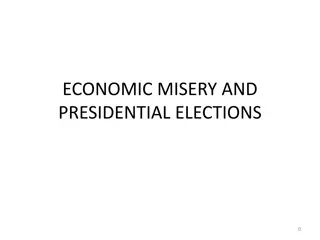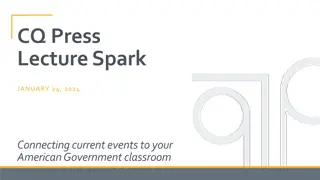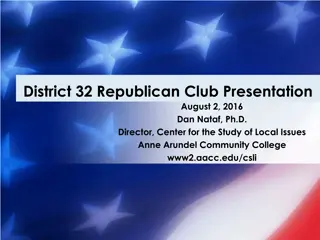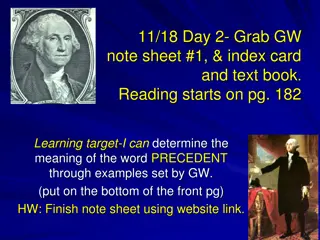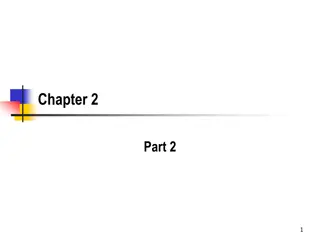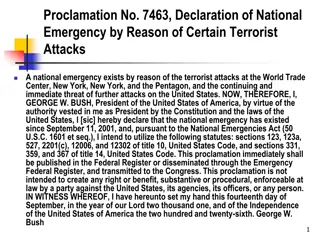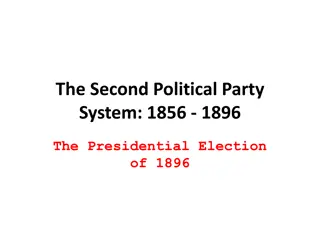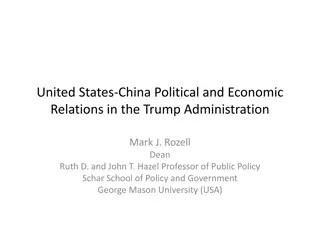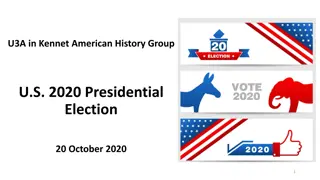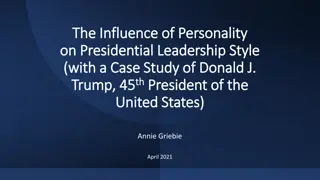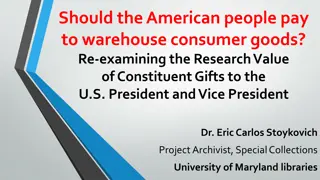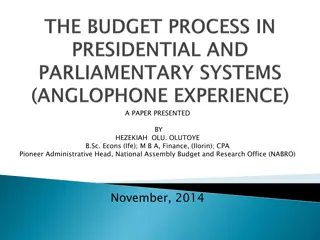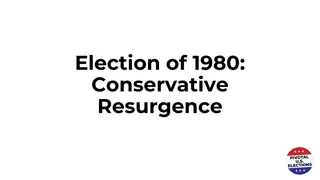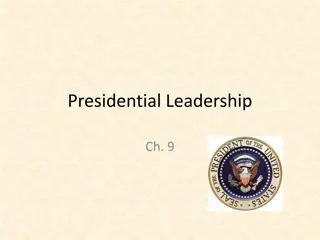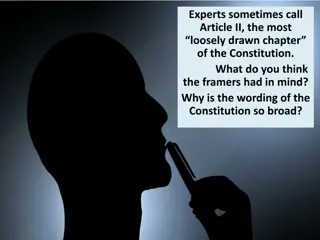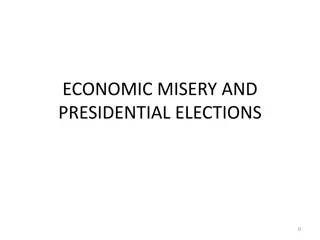Insights into the 2020 U.S. Presidential Debates
The content provides detailed information on the 2020 U.S. Presidential Debates, including engagement strategies, Georgia Standards of Excellence, learning targets, key vocabulary terms, debate facts, and thought-provoking questions for viewers. It covers historical context, candidate responses, debate facts, and encourages critical thinking about voting preferences.
Download Presentation

Please find below an Image/Link to download the presentation.
The content on the website is provided AS IS for your information and personal use only. It may not be sold, licensed, or shared on other websites without obtaining consent from the author.If you encounter any issues during the download, it is possible that the publisher has removed the file from their server.
You are allowed to download the files provided on this website for personal or commercial use, subject to the condition that they are used lawfully. All files are the property of their respective owners.
The content on the website is provided AS IS for your information and personal use only. It may not be sold, licensed, or shared on other websites without obtaining consent from the author.
E N D
Presentation Transcript
The 2020 U.S. Presidential Debates Presented by: The HHS U.S. History Department
ENGAGEMENT STRATEGY ENGAGEMENT STRATEGY 1. Students will review standard, element, and learning targets. 2.Students will Google relevant vocabulary terms and complete food for thought.
GEORGIA STANDARDS OF EXCELLENCE SSCG15 Demonstrate knowledge of local, state, and national elections b. Describe the nomination and election process. e. Analyze the influence of media coverage, campaign advertising, and public opinion polls. SSCG16 Analyze the difference between involuntary and voluntary participation in civic life. b. Describe how citizens voluntarily and responsibly participate in the political process by voting, performing public service, being informed about current issues, and respecting differing opinions.
LEARNING TARGET(S) 1. Analyze the history of presidential debates and describe how these public discourses have evolved since 1960. 2. Describe the responses and statements made by President Trump and Former Vice-President Biden as it pertains to the following issues: The U.S. Supreme Court COVID-19 Race and Violence in American cities
KEY VOCABULARY TERMS DEBATE PRESIDENT DONALD J. TRUMP FORMER VICE-PRESIDENT JOSEPH R. BIDEN INCUMBENT DEMOCRATIC PARTY REPUBLICAN PARTY MODERATOR SWING STATES VICE-PRESIDENT MICHAEL R. PENCE SENATOR KAMALA D. HARRIS CHRISTOPHER WALLACE
DEBATE FACTS DATE: SEPTEMBER 29, 2020 TIME: 9:00-10:30 P.M. (EST) LOCATION: CASE WESTERN RESERVE UNIVERSITY, CLEVELAND, OHIO MODERATOR: CHRISTOPHER WALLACE (FOX NEWS) DEMOCRATIC PARTY NOMINEE: JOSEPH R. BIDEN (CHALLENGER) REPUBLICAN PARTY NOMINEE: DONALD J. TRUMP (INCUMBENT)
FOOD FOR THOUGHT IF YOU WERE ALLOWED TO VOTE IN THE 2020 U.S. PRESIDENTIAL ELECTION, PLEASE STATE WHO YOU WOULD CAST YOUR VOTE FOR AND LIST A MINIMUM OF THREE REASONS FOR YOUR CHOICE. IF YOU ARE NOT SURE WHO YOU WOULD VOTE FOR, PLEASE STATE WHY. FINALLY, DO YOU THINK THAT THERE IS ANYTHING THAT EITHER PRESIDENT TRUMP OR FORMER VICE-PRESIDENT BIDEN COULD SAY TONIGHT THAT COULD CHANGE YOUR MIND? PLEASE EXPOUND ON YOUR RESPONSE.
EXPLORE, EXPLAIN, AND ELABORATION STRATEGY EXPLORE, EXPLAIN, AND ELABORATION STRATEGY 1. Students will review standards, learning targets and vocabulary terms. 2.Students will read a variety of passages relevant to the history of U.S. Presidential debates. 3. Students will also evaluate an activity that will prepare them to watch the first U.S. Presidential debate for 2020.
GEORGIA STANDARDS OF EXCELLENCE SSCG15 Demonstrate knowledge of local, state, and national elections b. Describe the nomination and election process. e. Analyze the influence of media coverage, campaign advertising, and public opinion polls. SSCG16 Analyze the difference between involuntary and voluntary participation in civic life. b. Describe how citizens voluntarily and responsibly participate in the political process by voting, performing public service, being informed about current issues, and respecting differing opinions.
LEARNING TARGET(S) 1. Analyze the history of presidential debates and describe how these public discourses have evolved since 1960. 2. Describe the responses and statements made by President Trump and Former Vice-President Biden as it pertains to the following issues: The U.S. Supreme Court COVID-19 Race and Violence in American cities
KEY VOCABULARY TERMS DEBATE PRESIDENT DONALD J. TRUMP FORMER VICE-PRESIDENT JOSEPH R. BIDEN INCUMBENT DEMOCRATIC PARTY REPUBLICAN PARTY MODERATOR SWING STATES VICE-PRESIDENT MICHAEL R. PENCE SENATOR KAMALA D. HARRIS CHRISTOPHER WALLACE
DEBATE HISTORY The tradition of great American election debates is often traced to the Illinois US Senate race of 1856, when seven three-hour debates between Abraham Lincoln and Stephen A. Douglas were held in outdoor venues in small towns like Freeport and Galesburg. These oratorical contests required the two candidates to speak at great length: the first candidate spoke for one hour, followed by a one and one half hour rebuttal, and then a half hour closing by the opening speaker. The central issue of these debates was slavery in the United States.
DEBATE HISTORY The first Presidential Debates took place in the 1960 election between John F. Kennedy and Richard Nixon. There were no debates from 1964 until 1976, because seated Presidents Lyndon B. Johnson and Richard Nixon refused to appear with their challengers. From 1976 to today, every Presidential contest has included televised debates, which have been crucial to the decisions of voters.
PURPOSE OF PRESIDENTIAL DEBATES The purpose of debates for the candidates and their respective campaigns is to make an effort to persuade undecided voters to vote for them. The candidates also use the debates to encourage voters who have already decided on a candidate to go out to the polls and vote. Another goal of each candidate is to bring attention to their strengths and to highlight the deficiencies of their opponent. This is all done in an effort to win the election on November 3, 2020.
HIGHLIGHTS FROM PREVIOUS DEBATES (1960) Massachusetts Senator John F. Kennedy (Democrat) vs. Vice President Richard M. Nixon (Republican) Four debates were televised nationally the first debates ever held between presidential candidates. In the critical first debate, Kennedy s physical presence dominated. Those who heard the debate on radio thought Nixon was the winner, while those who watched on television chose Kennedy conclusively. Major topics were the Cold War and Communism abroad (USSR, China, Cuba).
HIGHLIGHTS FROM PREVIOUS DEBATES (1980) President Jimmy Carter (Democrat) vs. California Governor Ronald Reagan (Republican) Only one debate was held between the two major contenders. A first debate had been held between Reagan and independent candidate John Anderson. Reagan Era conservatism was dramatically revealed, with his attacks on big government. Reagan had all the best lines: Are you better off than you were four years ago? and There you go again. Reagan s observed communication skills had a great deal to do with his victory in the election. Carter was criticized for quoting his 12 year-old daughter Amy in a discussion of nuclear weapons. Major topics were the Iranian Hostage Crisis, high inflation and the stagnating economy, inner city misery, and the nuclear threat.
HIGHLIGHTS FROM PREVIOUS DEBATES (2000) Texas Governor George W. Bush (Republican) vs. Vice President Al Gore (Democrat) Three debates were held, and moderated by the NewsHour's Jim Lehrer, who had been part of several former debates. Bush, who was widely believed to be incapable of standing up to outstanding debater Al Gore, held his ground and gained a great deal of support. Gore seemed wooden and repetitive: he repeated the concept of a locked box for Social Security funds many times. Major topics were big government, what to do with the large budget surplus from the Clinton years, and Bush s plan to cut taxes for all citizens, including the wealthiest Americans.
HIGHLIGHTS FROM PREVIOUS DEBATES ASSESSMENT QUESTIONS 1. Describe television s impact on voters perception of the results of the 1960 U.S Presidential debate. Please support your response with evidence from the text. 2. List a minimum of two major topics that were discussed at the 1980 U.S. Presidential Debate. Please explain why Ronald Reagan s line, Are you better off than you were four years ago? resonated with so many American voters, based on the issues that America faced in 1980. 3. What issue was Al Gore associating with the term locked box in the 2000 U.S. Presidential debate? How did his utilization of this term hurt him? 4. List a minimum of three issues you anticipate will be discussed in tonight s debate between President Trump and Former Vice-President Biden.
PLEASE CLICK ON THE PICTURE BELOW AND COMPLETE THE ACTIVITY AS YOU WATCH THE DEBATE!
EVALUATION STRATEGY EVALUATION STRATEGY 1. Review of standard, element, and learning target. 2. Students will write a summary that explains who they think won the debate and list at least two reasons that support their assessment.
GEORGIA STANDARDS OF EXCELLENCE SSCG15 Demonstrate knowledge of local, state, and national elections b. Describe the nomination and election process. e. Analyze the influence of media coverage, campaign advertising, and public opinion polls. SSCG16 Analyze the difference between involuntary and voluntary participation in civic life. b. Describe how citizens voluntarily and responsibly participate in the political process by voting, performing public service, being informed about current issues, and respecting differing opinions.
LEARNING TARGET(S) 1. Analyze the history of presidential debates and describe how these public discourses have evolved since 1960. 2. Describe the responses and statements made by President Trump and Former Vice-President Biden as it pertains to the following issues: The U.S. Supreme Court COVID-19 Race and Violence in American cities
KEY VOCABULARY TERMS DEBATE PRESIDENT DONALD J. TRUMP FORMER VICE-PRESIDENT JOSEPH R. BIDEN INCUMBENT DEMOCRATIC PARTY REPUBLICAN PARTY MODERATOR SWING STATES VICE-PRESIDENT MICHAEL R. PENCE SENATOR KAMALA D. HARRIS CHRISTOPHER WALLACE
FINAL THOUGHT Write a paragraph that explains who won the debate in your opinion and list at least two reasons that support your choice.
